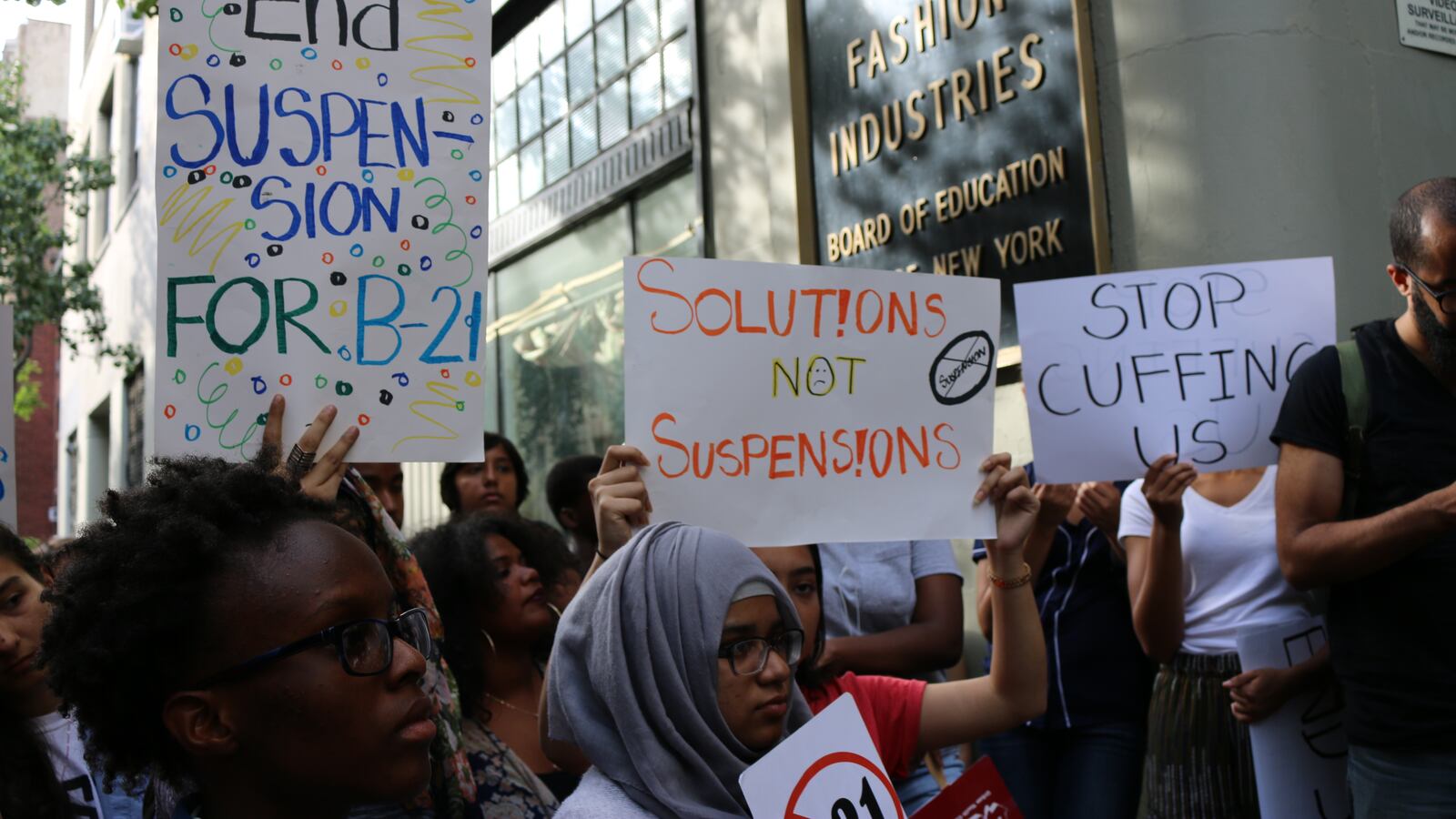Student suspensions decreased by nearly 16 percent last school year, as the city continues to push schools to use alternative approaches.
Schools issued almost 7,000 fewer suspensions in the 2015-16 school year compared with 2014-15, according to data released by the city Monday. School-related arrests dropped 10 percent, and summonses issued by school safety officers dropped 37 percent.
The steady drop in suspensions represents a 46 percent decline over five years, and comes after a series of policy changes that have made it harder for schools to suspend students for minor offenses.
But while the number of suspensions decreased in many demographic categories, black students and those with disabilities continue to be disproportionately removed from their classrooms.
About 50 percent of the city’s suspensions went to black students, even though they represent just over 27 percent of the student population. That’s slightly better than the previous school year, when that group represented 52 percent of the city’s suspensions.
Create line chartsWhite students accounted for nearly 8 percent of the city’s suspensions — up about half a percentage point from the previous year — despite being roughly 15 percent of the city’s students. Hispanic students accounted for almost 37 percent of suspensions and are just under 41 percent of students.
Students with disabilities, who make up around 19 of the city’s students, accounted for almost 39 percent of all suspensions. And while their total number of suspensions decreased by nearly 15 percent, they made up a slightly larger share of student suspensions than in the previous academic year.
City Department of Education spokeswoman Toya Holness acknowledged some of these disparities in a statement, noting that “we still have important work to do to ensure equity in school discipline.” But the city pointed out that suspensions due to insubordination — “historically a major factor of racial disparities” — declined 75 percent between the past two school years to 1,530 suspensions.
While advocates largely praised the reduction in overall suspensions, some remained troubled over persistent racial gaps, and argued that suspensions for insubordination should be eliminated entirely.
Simply reducing suspensions won’t solve the problem of racial injustice, explained Kesi Foster, coordinator for the Urban Youth Collaborative, which focuses on school discipline issues. Black youth are “disproportionately more likely to be suspended, arrested, receive a criminal summons, handcuffed, brought to precinct for a juvenile report, and be restrained as a child in crisis.”
Teachers union president Michael Mulgrew, who has been a vocal critic of the city’s approach to school discipline, said the numbers show “the trend is in the right direction.” Yet, he added, “Success should not be measured by the number of suspensions, but by the number of schools with an improved school climate.”
The city also released several statistics Monday for the first time. Teacher removals, which allow students to be excluded from a specific class for up to four days, rose 3 percent to 11,943 over the past five years. Holness attributed that increase to the department’s emphasis on more progressive discipline practices.
Though the number of suspensions has been falling since 2012, Monday’s numbers are the latest evidence that the city’s push to change the way students are disciplined is having an effect.
Last year, for instance, the city edited the discipline code so that principals would be required to get approval before suspending students for insubordination. And in July, the city announced it would ban suspensions for students in grades K-2 — though the discipline code does not yet reflect that policy. A Department of Education spokeswoman noted the changes were being finalized, but could not immediately offer a firm timeline for the change.
The city also attributed the decline in suspensions to increased trainings on a variety of restorative justice practices and crisis interventions, and has committed to hiring hundreds of additional counselors and mental health consultants.
“We’re encouraged by the steady decrease in suspensions along with crime, summonses and arrests,” schools Chancellor Carmen Fariña said in a statement, “and continue to expand trainings and build stronger community ties to ensure all students feel safe and are ready to learn.”

